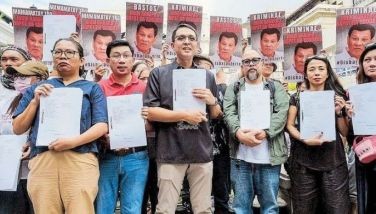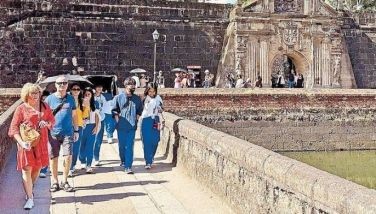RM Awards wants to reach out to youth
MANILA, Philippines - This year, the Ramon Magsaysay Awards Foundation (RMAF), which gives out the prestigious Ramon Magsaysay Award, wants to touch base with the younger generation to encourage them to apply their skills to community service.
The annual award, considered the Nobel Prize of Asia, is given to individuals or organizations that have shown exemplary service to the community.
“Our goal is to reach out more effectively to younger sectors. We have noted that most of our laureates are seniors already,” said RMAF chair Emily Abrera during a roundtable with media at the Ramon Magsaysay Center yesterday. “We are now making great efforts to seek out people who have been doing good work, no matter what age they are.”
The youngest Magsaysay laureate was Lhamo Thondup, the 14th Dalai Lama of Tibet, who received the award for community servuice in 1956 when he was 26.
In 2001, 27-year-old labor leader Dita Indah Sari won he award for confronting the labor exploitation of sweatshops in Indonesia.
In 1962, the award was conferred on Mother Teresa of Calcutta when she was in her 30s.
“Every year, we have difficulty arguing for a younger nominee because of the limit of track record, but we have an age bound category for emerging leadership which is given specifically to people under 30,” said RMAF president Carmencita Abella.
The award has a particularly strong presence in India, where it practically enjoys the same prominence as the Nobel.
RMAF vice chair Cynthia Bautista said Indians appreciate the independence of the foundation from political influence.
“Based on the study I’ve done on the impact of the award, I discovered that the award is very prestigious in India. They never associate the award with anything political, many of them apply for the award,” she said yesterday.
Since the inception of the award in 1957, 48 nominees from India have received the award, most of them advocates for human rights. The Philippines has the next most numbers of awardees with 42, followed by Japan with 24, and Thailand with 22.
The award has also attracted great interest in Thailand where awardees occasionally gather as the “Ramon Magsaysay Awardees group.”
“It’s a big thing too in Thailand, primarily because the ones recognized were those considered as the great men and women of Thailand,” Bautista said.
She says that in countries where the award is not that well known, like in South Korea, the memory of the late President Ramon Magsaysay is respected because Koreans have read about his work.
“And they respect him (Magsaysay). And because of that, they start respecting the awardees,” Bautista said.
John Rockefeller III, a philanthropist and member of the prominent Rockefeller family, initiated the award after Magsaysay’s death in a plane crash on March 17, 1957.
Magsaysay was Rockefeller’s personal friend. During his visit to the Philippines with his wife, the former president took him to agricultural communities in Nueva Ecija and Zambales.
‘When John came to Asia and the Philippines, he wanted to have a more concrete sense of what is going on, so President Magsaysay arranged for him to go to some barrios in Nueva Ecija and Zambales and they visited communities and walked in the rice paddies,” said Abella.
“And he saw at that time how artesian wells were being introduced. And they were so impressed with him. He saw that Magsaysay was a leader who is well-connected with the masses, that he is practicing a functional democracy.”
After his death, Rockefeller did more than honor Magsaysay’s memory with a customary monument.
“Monuments, of course, were popular at that time, but Albert Ravenholt, friend of the Rockefellers, said why don’t you consider honoring people like Magsaysay so there would be more like him in Asia? ” Abella said.
The creation of the award was considered as revolutionary at that time because there were few awards bodies recognizing leadership excellence.
Abella said the foundation protects the integrity of the award by making sure that it is not tainted with politics.
To level the playing field for nominees, the award is not conferred on an incumbent president.
President Corazon Aquino, who was president from 1986 to 1992, received the award in 1998.
“An incumbent leader has access to resources, so how do you know his achievements come from the greatness of his spirit,” he said.
The foundation admits that it is having difficulty penetrating authoritarian countries like Myanmar.
About two years before Myanmar opposition leader Aung San Suu Kyi received the Nobel Peace Prize in 1991, she was nominated for the award but the political conditions in the military-ruled country prevented the foundation from personally meeting with Suu Kyi, a requirement for the conferment of the award.
The awards ceremonies for this year’s laureates will be held on Aug. 31 at the Cultural Center of the Philippines.
- Latest
- Trending

































